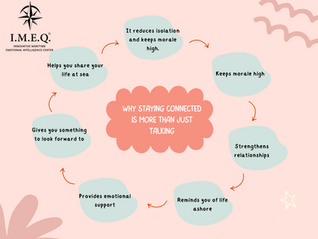Crew Health Advice: Hernias
- IMEQ CENTER

- May 7, 2024
- 3 min read

What is a hernia?
A hernia occurs when an internal part of the body pushes through a weakness in the muscle or surrounding tissue wall.
There are 4 main types of hernia:
• Inguinal hernias – This is the most common type of hernia and mainly affects men. It happens when a fatty tissue or part of your bowel pokes through into your groin at the top of your inner thigh.
• Femoral hernias – These also occur when fatty tissue or a part of your bowel pokes through into your groin at the top of your inner thigh. These are less common and tend to affect women more than men.
• Umbilical hernias – This happens when fatty tissue or a part of your bowel pokes through your stomach near the belly button.
• Hiatus or Epigastric hernias – when part of the stomach pushes up into your chest by squeezing through an opening in the diaphragm, the thin sheet of muscle that separates the chest from the stomach.
What causes hernias?
The main cause is a weakness of the muscles. In seafarers we see this due to ageing, being overweight, bowel problems such as constipation or most commonly, by lifting things that are too heavy. This causes repeated strain on the muscles which then leads to weakness and potential herniation of the fatty tissue or bowel.
How do I know if I have a hernia? What are the signs and symptoms?
Common symptoms are:
• A lump or bulging in the affected area, This may disappear when you lie down
• Discomfort or pain around the lump or bulge
Depending on the type of hernia you may also have:
• Heartburn
• Trouble swallowing
• Chest pain
What should I do if I think I may have a hernia?
When onboard ship it is important to seek advice early on. Many medical conditions can be treated more effectively and quickly when early help is sought. Speak to the Master or Chief Mate and report your symptoms. They will conduct an assessment and seek advice from a Doctor ashore.
Make some moderations to your lifestyle as well to ease the strain on the area. This could include losing weight, if you smoke then try and give up as this can lead to weakening of the connective tissues, stop heavy lifting and when you do lift items make sure that you use safe manual handling techniques.
What can be done to assist me onboard?
The Master or Chief Mate will carry out a thorough assessment of your symptoms and speak to a Doctor ashore. Depending on the severity of the symptoms you will be given pain medication and some lifestyle advice to reduce the symptoms and prevent it from getting any worse. You will most likely need to be seen ashore to assess the extent of the problem. It is unlikely that this will be done as an emergency, but more likely that it will be at the next port of call or even when you sign off and can go and see your own Doctor.
Can hernias be serious?
Yes, absolutely. In the case that you develop more severe symptoms then you will need urgent medical attention. Those symptoms could include:
• Sudden, severe pain
• Vomiting
• Difficulty passing stools or wind
•The lump becomes firm or tender or can not be pushed back in
How are hernias treated?
In the majority of cases surgery is required to fix the hernia. It is a routine surgery, except in the cases of serious complications, and can be done at a time to suit you. Many people choose to live with the hernia and your Doctor will discuss those options with you.
What can I do to prevent a hernia?
Pay attention to what you are doing. Lifestyle factors such as being overweight and smoking will increase your susceptibility to hernias as will heavy lifting and vigorous exercise. Never lift more than you are comfortably able, and always use lifting devices where possible. If you think you have a hernia, report it immediately to the Master or Chief Mate onboard.
This advice was compiled in collaboration with Red Square Medical, who offer a full range of maritime medical services, from training and consultancy services, right through to mass casualty incident planning and training.
UK P&I Club are contributing Loss Prevention and Crew Health materials for the IMEQ Seafarers App as part of our established partnership. For further information on the UK P&I Club Loss Prevention and Crew Health activities please see www.ukpandi.com





































































































very serious